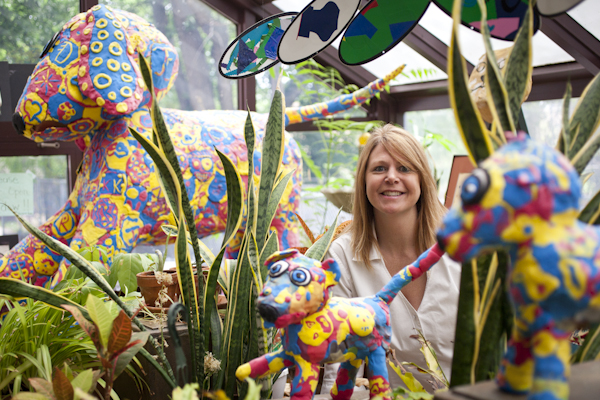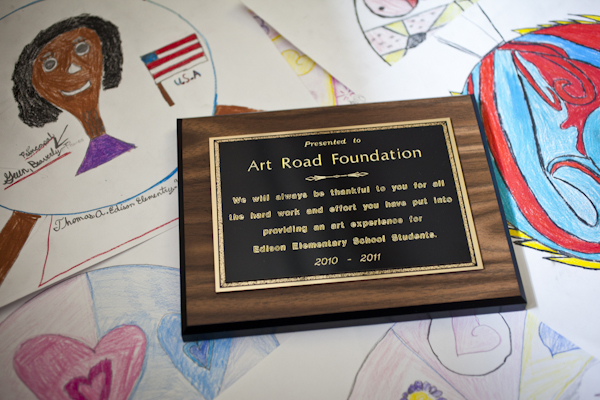City Kids: Creating Detroit’s future with art education
Students at Detroit’s Edison Elementary School are getting hands-on art training that could be the gateway to increased interest in higher education and a multitude of career options afterward. Melinda Clynes visits this creative class and comes back impressed with the results.
On a sunny Friday morning in late May, Edison Elementary School on Detroit’s West Side is abuzz with activity. Students are making butterfly magnets with pipe cleaners, tissue paper and googly eyes. Here in the art room, a certain glow saturates the space as kindergartners attentively curl pipe cleaners into antennas and deliberate over butterfly wing colors of candy-apple red, sky blue and lime green.
Edison, like many schools in Detroit, does not have an art program, but thanks to Art Road, a nonprofit that provides art classes in schools without art programs, Edison students have a chance to reap the benefits of creating art. And they dig it.
According to Art Road founder and executive director Carol Hofgartner, the benefits of art instruction include increased interest in school, improved test scores, better problem solving skills, and a sense of pride and accomplishment. She says that the experiential process of making art is crucial to success in school and in life. “We’re giving them that experience and showing them how art is needed for many careers, like architecture, graphic design, packaging and automotive design,” says Hofgartner, who believes children need their creative side nurtured to be successful in most careers.
Art Road currently works with Edison to provide art class twice a month to all 400 K-5 students. The school had no art teacher for seven years before Art Road; now students are privy to art instruction by graduates of Cranbrook Academy of Art. “The students have gone from no art class to the best in the world,” notes Hofgartner. Art Road introduces children to the work of artists and to art history — always with a hands-on project, such as painting, drawing, mixed media and sculpture. They’ve designed holiday cards, painted hubcaps, and designed cut-paper collages.
Along with the art instructor, the program is typically staffed by Hofgartner; her husband Stephen Hofgartner, Art Road’s operations manager and volunteer coordinator; and a team of three to five volunteers, who are invaluable in lending a hand with the various classes ranging in size from 25 to 30 pupils. “We have many moms that come and volunteer in the art room and say how kind and happy our art students are — and that our art is better than the art their kids are bringing home from private schools.”
The program is expanding next fall to Charles H. Wright Academy of Arts & Sciences in the northwest corner of Detroit. Art Road will provide art classes to 400 students twice a month with hopes to expand the program to all 700 students if money can be secured.
Funding is an ongoing challenge to any growing nonprofit, but being of the creative ilk, Hofgartner employs some clever approaches. She is currently running an ad in the Woodward Quarterly to sell a “Hub Cap Art Collection” painted by Edison kindergartners. The entire $6,800 selling price will be tax deductible for the buyer. The Art Road website promotes the program’s value, noting that a $10,000 donation will provide art class to 40 students for the entire school year. For those with less to give, the Art Road brochure reminds donors that every gift counts: “It costs just $7 per child to fund an Art Road class.” What a deal.
Despite fundraising demands, Hofgartner is vehement about the value of art. She bagged her career in architecture to create Art Road. The project evolved over a number of years, starting in 1995 when Hofgartner was asked to speak about architecture at a career day at Weatherby Elementary School, which has since closed. She presented construction documents and talked about being inspired by her experience in school art class when she was young.
A student told her that the school had no art classes; soon thereafter Hofgartner began volunteering to teach art twice monthly to fifth graders at Weatherby. Seven years later, she moved it from a solo project to a full-blown nonprofit that ran in Ypsilanti for two years before starting at Edison in 2006. Hofgartner has a vision to make sure all children in southeast Michigan have access to art classes. “Bringing art to 25 fifth graders once a month was very rewarding, but the need was so much bigger,” she says.
Art Road runs seven art sessions at Edison every Friday (children attend every other week), providing the planning costs, art instruction and supplies at no cost to parents or the school. It has spearheaded renovations at Edison too. In 2009, Art Road volunteers from Mercedes-Benz Financial Services cleaned and painted the Edison art room and renovated its attached greenhouse, which now serves as an art gallery, displaying vibrant student artwork among a collection of green plants. They cleaned up the grounds of the school and painted lines for the basketball court.
These volunteers, along with students and other artists, also painted a mural in the hallway outside the Edison art room. Everyone involved signed the mural, instilling ownership and pride for its many contributors.
Edison students were also involved in creating sketches for the design of a sculpture. Art Road instructor and Fulbright scholar Carrie Fonder created the sculpture in 2009 based on a fifth grade student’s drawing. The idea was to start an art garden outside the art room, with the sculpture as the centerpiece. The school principal requested, instead, that the sculpture be placed in the front of the school for all to see — a symbol of art being back and here to stay at Edison Elementary School.
Sadly, the sculpture was stolen off the front lawn last month. Not one to be deterred, Hofgartner is now raising $20,000 to make a 20-foot steel sculpture that will be difficult to swipe. She hopes to raise the full amount by August 1, using Crowdrise.
Hofgartner and her merry band of volunteers are part of a movement of individuals who would rather be an impetus of change than stand up at school board meetings and gripe. “It is easy to look from the outside on any issue and complain or make comments — we are proud to be a part of a creative solution to bring art back to schools,” Hofgartner says. And with her ingenuity and persistence, Detroit’s young artists are blossoming.
Melinda Clynes is a freelance writer who will be sharing the City Kids series with freelancer Amy Kuras. Look for their stories on Detroit family life and education in Model D throughout the year.












